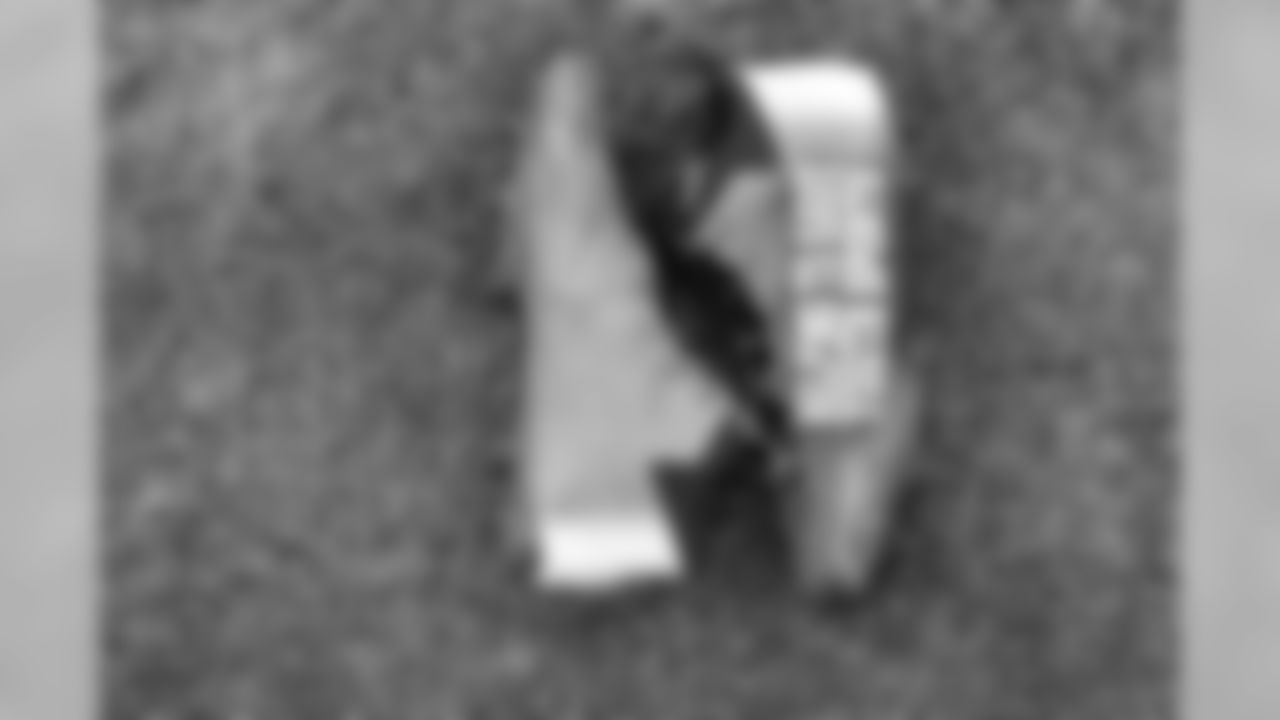**
During Week 13, Steelers players will have the opportunity to showcase their chosen charitable cause on their game cleats. See what they will wear.

Heyward House Foundation

Heyward House Foundation

Heyward House Foundation

Shriners Hospitals for Children

Shriners Hospitals for Children

Shriners Hospitals for Children

Shriners Hospitals for Children

Shriners Hosptials for Children

Shriners Hospitals for Children

American Football Without Barriers

American Football Without Barriers

American Football Without Barriers

Live Your Vision Foundation

Live Your Vision Foundation

Live Your Vision Foundation

Lupus Foundation of America

Lupus Foundation of America

Lupus Foundation of America

Call of Duty Endowment

Call of Duty Endowment

Call of Duty Endowment

Sports Matter

Sports Matter

Sports Matter

Call of Duty Endowment

Call of Duty Endowment

Call of Duty Endowment

Operation Underground Railroad

Operation Underground Railroad

Operation Underground Railroad

Operation Underground Railroad

Operation Underground Railroad

Operation Underground Railroad

Operation Underground Railroad

Operation Underground Railroad

Operation Underground Railroad

Women's Center & Shelter of Greater Pittsburgh and The Refuge House

Women's Center & Shelter of Greater Pittsburgh and The Refuge House

Women's Center & Shelter of Greater Pittsburgh and The Refuge House

Special Olympics

Special Olympics

Special Olympics

Special Olympics

Special Olympics

Special Olympics
Q. Let's start with the practice of scripting plays. Please explain what that means to the average fan?**
A. Often times, teams script plays to gather information, to see certain things from themselves and from their opponents at the early stages of games. They would like to see how the opponent responds to personnel groups and personnel changes within certain situations. They want to see how they match up with certain personnel, with certain anticipated personnel vs. the opponent's anticipated personnel. And sometimes, they just want to be thoughtful about being versatile, or showing a variety of types of plays at the early stages of games. So the coordinator will take the thinking out of it and script some of those things.
Q. How many plays are usually in a script?
A. It depends. Most scripts are usually from 10-to-15 plays, but it doesn't mean they're played out over the course of 10-to-15 plays in a game. If you have a 10-play script, it may take 16-to-18 plays to get through it, when you take out the situational football aspect of it, (because) any short-yardage play wouldn't be included in the script, nor would any third-down or possession-down play. Often, you'll watch offenses push through the first quarter on scripted plays on first and second downs.
Q. Do you ever practice the scripted plays in the order you plan to run them during a game?
A. Certainly. I don't want to make it sound like it's exclusive to offensive football. Defenses have a script as well. Given certain circumstances, if they run this personnel group out there, then this is what we're going to call in this order, in an effort to show variety on the other side of the ball.
Q. It's the fourth quarter vs. Green Bay. There is 1:20 left in a tie game, and the Packers have the ball on their 18-yard line. On first down, Brett Hundley is sacked by T.J. Watt. What was your thinking in not calling a timeout there?
A. I just wanted to see how they wanted to play the circumstances. I'm always working a hold on the timeouts, because if we got the ball back I wanted to have at least one, so we could have the full field at our disposal, as opposed to having to work the sidelines. If we have to work the sidelines, when we got the ball back we don't get that play in to Antonio Brown. As difficult as it was to get the ball in there, if we had to work the sidelines, it would've been next to impossible.
Q. Generally speaking, is it better to have your timeouts saved for offense?
A. I do. And in that particular circumstance, I thought it was imperative we hold onto those timeouts, or as many of them as we could, so we could have the full field at our disposal in an effort to move the ball down into field goal range, and we didn't have to run out onto the field in a may-day-like field goal attempt. I knew it was potentially going to be a long field goal, and I didn't want to add sugar on top with a may-day-like scenario where you had to run the field goal unit on from the sidelines. Those were the two main reasons why I was really working to hold timeouts.
Q. Six of your games so far have been one-score finals, and you're 5-1 in those. Are there advantages to a team that's involved in a lot of close games, and what might those advantages be?
A. I think you get real comfortable with communicating, and communicating things that need to happen in those circumstances. I know when we're in those circumstances, and we've been in them enough this year, no one is looking around and wondering. It's normal communication. Guys do a good job of having necessary conversations and staying focused on the task at hand. More than anything, the more exposure you have to the moment, the more comfortable you get in the moments. And not comfortable in the ways that you and I would think normally of comfortable, but comfortable in that you know what has to be done and you understand your role within that and you understand the level of communication that needs to be had.
**
Q. Going through those situations successfully, does a confidence build and is it significant?**
A. Confidence is a byproduct, and it is significant, because what we're talking about is a collective confidence. Football is the ultimate team game, but a lot of time the athletes have individual stories of success that have gotten them to this point. That collective knowledge, that collective knowing that you can come together and get the job done, that's what makes football so challenging and so rewarding at the same time.
Q. Do teams do research on officiating crews and then ever use that as a kind of scouting report to have some idea of what can be expected from a particular crew in a particular game?
A. Yes, I just think that's part of today's NFL. We know who the crews are prior to the game. We have a pretty good history of their track record in how they call games, not only in 2017 but in recent history. We generally have a pretty good idea of our shared history with particular officiating crews. It's just part of normal business.
Q. Is that information just for the coaches, or do you share that with the players?
A. Oh, no, we share that with the players. That's an important element of it as well.
Q. A couple of weeks ago – after the Tennessee game – you said this at your news conference: "Thought it was significant also that [Chris] Boswell hit on a 50-yard field goal. We've been challenging him to produce for us and in those opportunities and moments. I thought that was a big one at the end of the half that he was able to give us an additional three points with the 50-yarder." Against the Packers, Boswell kicked a 53-yard field goal at the end of the game to win it. How do you go about challenging a player the way you described there?
A. We just enjoy talking about the elephant in the room. We've talked openly in team settings, particularly team settings geared toward special teams that the trend in the National Football League is that it's commonplace for starting-caliber kickers to bang 50 percent from 50 yards or better. We highlighted some of the guys we compete against – like Justin Tucker in Baltimore who does – and we've been openly challenging Boswell to live up to that standard. He hadn't been. We openly talk about it, but it goes beyond that, We take those challenges to the field. When we have field goal sessions we make sure there are some plus-50-yard kicks in all of those, and it captures the team's attention. And I think that's all geared toward making sure that he understand that we need him, we rely upon him, and he's as much a part of the team in terms of the things he does as Le'Veon toting the football. I think he embraces it, I think he enjoys being a part of it, I think he loves being challenged in that way – openly by me and his teammates – and as you can see, he has been delivering.
**
Q. I know your preference would be that Cam Heyward would be unable to play in the Pro Bowl because of another commitment, but does he deserve to be voted to the Pro Bowl?**
A. He does. He's playing at a Pro Bowl caliber level. It's always an interesting thing in today's NFL with half the teams being 3-4 teams and half the teams being 4-3 teams, because the reality is that your 3-4 defensive ends get slighted because they're described as defensive ends, and Cam Heyward is an elite interior rush-man. He's a defensive tackle from a Pro Bowl standpoint and should be treated as such. Geno Atkins often goes to the Pro Bowl as a defensive tackle. He's a top-flight interior guy from Cincinnati that we're playing this week, and I think he's got six sacks. To put it into perspective, Cam Heyward is an interior rush-man and we realize his sack total. But he always gets categorized as a defensive end because of the scheme in which he plays. It's really the same issue that 4-3 outside linebackers have. You could be a dominant 4-3 outside linebacker, with 130-some tackles but not a lot of sacks. But if you get a 3-4 outside linebacker who has 10-11 sacks, he's going to go at the outside linebacker position. So 4-3 outside linebackers and 3-4 defensive ends often get slighted because of numbers and the things numbers may tell people regarding the Pro Bowl.
Q. There was only one personal foul called in the first meeting of these teams. What kind of game do you expect on Monday night?
A. I don't know, because I coach one team. And so, I generally go into these things knowing what to expect from my group and anticipating the unexpected from the other. I think that's just the appropriate approach to take when you're in my position. I expect our guys to be singularly focused on playing hard and winning. This is AFC North ball, this is Monday night ball. We respect all of those things. We'll be excited and hopefully play well.
Q. We've often heard it said after games between bitter rivals that the officials took control of the game. What does that mean?
A. I have no idea. I think that's just one of those commentary clichés that really doesn't mean a lot. I imagine at some point it was significant. I don't know what it means anymore.














